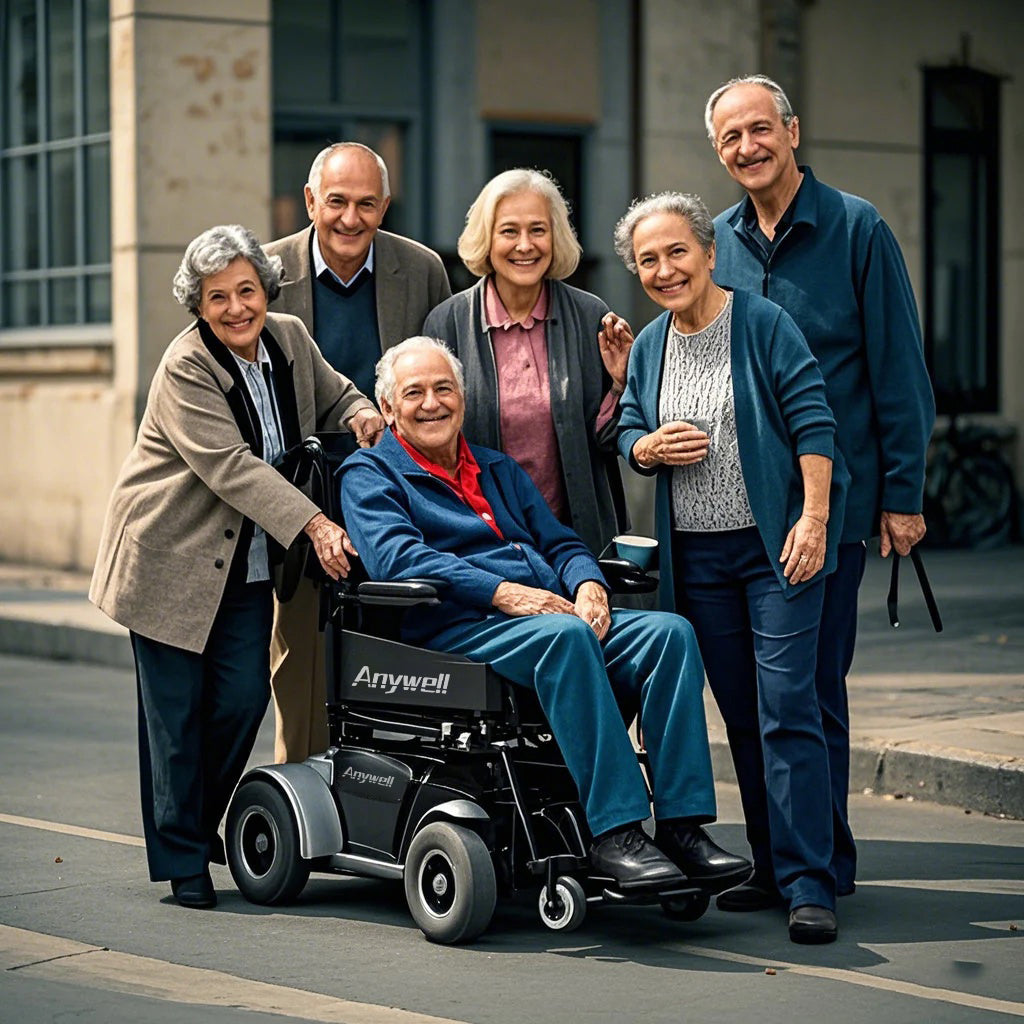Who Buys Power Wheelchairs? Understanding the Buyers and Their Needs
1. Introduction
In recent years, Who buys power wheelchairs have evolved from basic mobility aids into advanced, highly adaptable devices designed for various lifestyles and medical needs. Global demand is on the rise, driven by an aging population, improved technology, and greater awareness of accessibility rights.
But one question remains: Who buys power wheelchairs? Understanding the types of buyers and their needs is crucial for anyone in the mobility aid industry—whether you’re a manufacturer, distributor, healthcare provider, or caregiver.
At Anywell, we design FDA & CE-certified electric wheelchairs that meet the diverse needs of users worldwide. Our popular models, YS12-15 and YS16-1, cater to different user profiles, from frequent travelers to obese users requiring extra seat width and weight capacity.
2. The Core Value of Power Wheelchairs
Before diving into the buyer profiles, let’s look at why power wheelchairs are so essential:
- Mobility Independence – Users can move freely without relying on constant physical assistance.
- Improved Quality of Life – Access to social activities, work, and travel.
- Medical and Rehabilitation Support – Ideal for patients recovering from injury or living with chronic mobility limitations.
These devices are more than just tools—they are lifelines for independence.
3. Who Buys Power Wheelchairs? Buyer Personas
3.1 Elderly Users
- Why they buy: Age-related mobility decline, arthritis, or chronic pain.
- Key needs: Stability, comfort, easy controls, and safety features.
- Example fit: The Anywell YS12-15 offers a lightweight design perfect for daily use and easy transportation.
3.2 People with Disabilities
- Why they buy: Spinal cord injuries, muscular dystrophy, cerebral palsy, or congenital mobility impairments.
- Key needs: Long-term durability, adjustable seating, strong motors.
- Example fit: Both YS12-15 and YS16-1 provide ergonomic designs with reliable power for daily independence.
3.3 Post-Surgery or Recovery Patients
- Why they buy: Temporary mobility limitations after orthopedic surgery or injury.
- Key needs: Easy maneuverability, comfort during prolonged sitting, short-term rental or purchase.
- Example fit: The YS12-15 folding power wheelchair is lightweight yet supportive for recovery needs.
3.4 Obese Users
- Why they buy: Standard wheelchairs often fail to meet weight capacity and seat width requirements.
- Key needs: High weight limit, wide seat, reinforced frame.
- Example fit: Anywell YS16-1 – supports up to 150kg, designed with an extra-wide seat for maximum comfort.
3.5 Frequent Travelers or Workers
- Why they buy: Need a portable mobility solution for business trips, vacations, or daily commuting.
- Key needs: Foldable design, airline-approved battery, lightweight frame.
- Example fit: YS12-15 folds in seconds, perfect for car trunks and air travel.
4. Key Factors Buyers Consider Before Purchasing
When deciding which power wheelchair to buy, customers typically evaluate:
- Weight Capacity – Must safely support the user’s body weight.
- Battery Range – Enough distance per charge for daily activities or travel.
- Foldability & Portability – Especially important for users with limited storage space or frequent travel plans.
- Comfort & Ergonomics – Seat padding, armrest position, and back support.
- Brand Reputation & Certifications – FDA and CE approvals signal safety and quality.
Tip: Anywell’s YS16-1 and YS12-15 meet both FDA & CE standards, ensuring compliance with global safety regulations.
5. Why Choose Anywell
Anywell YS12-15
- Lightweight folding design
- 100kg weight capacity
- Long battery life for daily errands and travel
- Ideal for elderly users, recovery patients, and frequent travelers
Anywell YS16-1
- Wide seat for enhanced comfort
- 150kg weight capacity for obese users
- Strong, durable frame for long-term use
- Ergonomic design to reduce fatigue during long sitting hours
Shared Advantages
- FDA & CE certified
- Easy to operate
- Strong after-sales service with global support

6. Real Customer Stories
- Elderly User in the US: “The YS12-15 has given me my independence back. I can go to the park with my grandchildren without worrying about fatigue.”
- Obese User in Canada: “Finding a wheelchair that supports my weight and fits comfortably was hard—until I found the YS16-1.”
- Traveler in the UK: “I fly often for work, and the YS12-15 folds easily into my car or airplane storage without issues.”
7. Frequently Asked Questions (FAQ)
Q1: What’s the difference between a power wheelchair and a mobility scooter?
A: Power wheelchairs are designed for indoor and outdoor use with tighter turning radiuses, while mobility scooters are better for outdoor travel but require more space to maneuver.
Q2: How long can a power wheelchair last?
A: With proper maintenance, high-quality models like Anywell’s can last 5–10 years.
Q3: Can I take a power wheelchair on an airplane?
A: Many foldable models with airline-approved batteries, such as YS12-15, are travel-friendly.
Q4: How do I choose the right model for my needs?
A: Consider weight capacity, seat size, travel frequency, and your physical condition.
8. Conclusion & Call to Action
Who buys power wheelchairs? Power wheelchairs are purchased by a diverse range of people—from elderly users to obese individuals—each with unique needs. Choosing the right model can significantly improve mobility, independence, and quality of life.
With FDA & CE-certified models like Anywell YS12-15 and YS16-1, you can find a perfect fit for comfort, safety, and performance.
👉 Visit AnywellShop.com to explore our full range and reclaim your freedom today.
Recommended Reading
1. Which Electric Wheelchair Brand is Best? [2025 Review of Top 5 Brands with Pros & Cons]
2. Anywell YS16–1: The Best Electric Wheelchair for Obese Users | FDA & CE Certified







Leave a comment
This site is protected by hCaptcha and the hCaptcha Privacy Policy and Terms of Service apply.